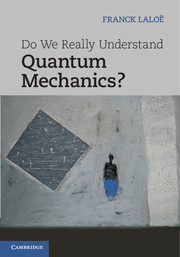Book contents
- Frontmatter
- Contents
- Foreword
- Preface
- 1 Historical perspective
- 2 Present situation, remaining conceptual difficulties
- 3 The theorem of Einstein, Podolsky, and Rosen
- 4 Bell theorem
- 5 More theorems
- 6 Quantum entanglement
- 7 Applications of quantum entanglement
- 8 Quantum measurement
- 9 Experiments: quantum reduction seen in real time
- 10 Various interpretations
- 11 Annex: Basic mathematical tools of quantum mechanics
- Appendix A Mental content of the state vector
- Appendix B Bell inequalities in non-deterministic local theories
- Appendix C An attempt for constructing a “separable” quantum theory (non-deterministic but local)
- Appendix D Maximal probability for a state
- Appendix E The influence of pair selection
- Appendix F Impossibility of superluminal communication
- Appendix G Quantum measurements at different times
- Appendix H Manipulating and preparing additional variables
- Appendix I Correlations in Bohmian theory
- Appendix J Models for spontaneous reduction of the state vector
- Appendix K Consistent families of histories
- References
- Index
2 - Present situation, remaining conceptual difficulties
Published online by Cambridge University Press: 05 September 2012
- Frontmatter
- Contents
- Foreword
- Preface
- 1 Historical perspective
- 2 Present situation, remaining conceptual difficulties
- 3 The theorem of Einstein, Podolsky, and Rosen
- 4 Bell theorem
- 5 More theorems
- 6 Quantum entanglement
- 7 Applications of quantum entanglement
- 8 Quantum measurement
- 9 Experiments: quantum reduction seen in real time
- 10 Various interpretations
- 11 Annex: Basic mathematical tools of quantum mechanics
- Appendix A Mental content of the state vector
- Appendix B Bell inequalities in non-deterministic local theories
- Appendix C An attempt for constructing a “separable” quantum theory (non-deterministic but local)
- Appendix D Maximal probability for a state
- Appendix E The influence of pair selection
- Appendix F Impossibility of superluminal communication
- Appendix G Quantum measurements at different times
- Appendix H Manipulating and preparing additional variables
- Appendix I Correlations in Bohmian theory
- Appendix J Models for spontaneous reduction of the state vector
- Appendix K Consistent families of histories
- References
- Index
Summary
Conceptual difficulties still remain in quantum mechanics, even if they had already been identified by its inventors. This does not mean that the theory is not successful! The reality is quite the opposite: in fact, independently of these difficulties, quantum mechanics is certainly one of the most successful theories of all science. One can even consider that its ability to adapt to new situations is one of its most remarkable features. It continues to give efficient and accurate predictions while new experiments are performed, even in situations that the founding fathers had no way to imagine. Actually, there are very few theories that have been verified with the same accuracy in so many situations. Nevertheless, it remains true that conceptual difficulties subsist, and their discussion is the object of this chapter. As we will see, most of them relate to the process of quantum measurement, in particular to the very nature of the random process that takes place on this occasion.
We have seen that, in most cases, the wave function evolves gently, in a perfectly predictable and continuous way, according to the Schrödinger equation; in some cases only (when a measurement is performed), unpredictable changes take place, according to the Von Neumann postulate of state vector reduction. Obviously, having two different postulates for the evolution of the same mathematical object is very unusual in physics. The notion was a complete novelty when it was introduced, and still remains unique, but also the source of difficulties – in particular logical difficulties related to the compatibility between the two different postulates.
- Type
- Chapter
- Information
- Do We Really Understand Quantum Mechanics? , pp. 17 - 37Publisher: Cambridge University PressPrint publication year: 2012



